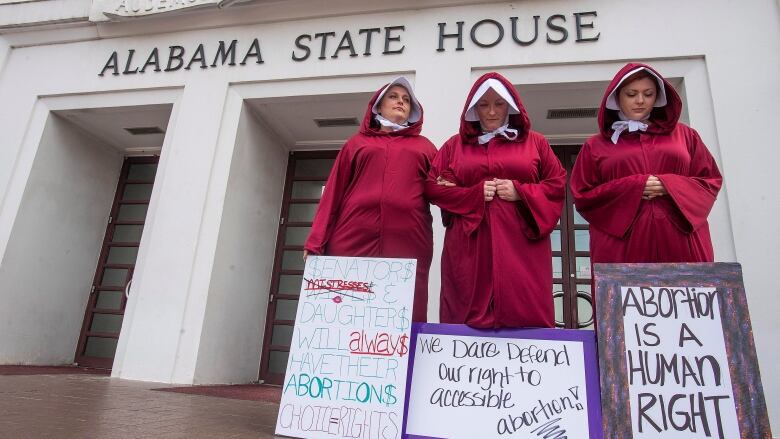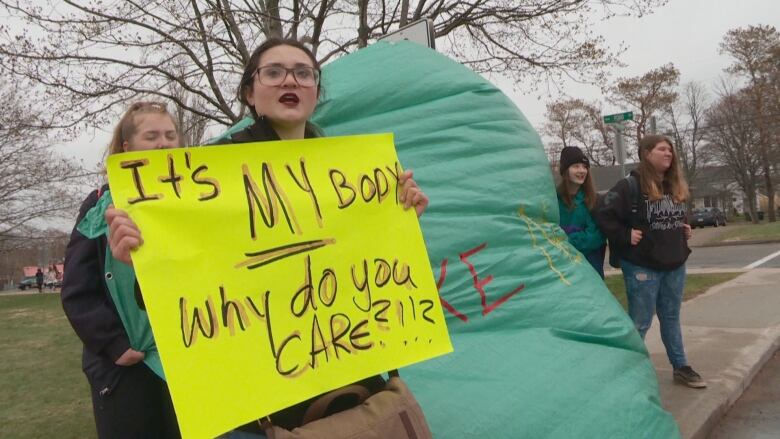Q&A: How secure are abortion rights in Nova Scotia?
Lawyer Sarah Baddeley says issues with access have more to do with stigma than the law

Alabama recently passed a law that effectively bans abortion one of several Republican-led states to legislate restrictions on access to the procedure.
These sweeping changes may eventually lead to the overturning of Roe v. Wade, a landmark U.S. Supreme Court decision that helped solidifya woman's right to choose whether or not to have an abortion.
A Canadian legal advocacy group says Canada's abortion laws are ironclad, and issues with access have more to do with stigma than they do with the law.
Sarah Baddeley, chair of the Halifax chapter of the Women's Legal Education and Action Fund (LEAF,) recently spoke with Pauline Dakin of CBC's Information Morning. The interview has been edited for length and clarity.
What do you make of what's happening in Alabama and the other states imposing severe restrictions on abortion?
I think it's sincerely terrifying. It's reminding a lot of us in Canada how lucky we are to have the reproductive freedoms that we have. And I think it's raising some concerns about how secure they are, seeing such a significant change in the U.S.
Just how secure are they, for example, here in Nova Scotia?
I think that they're actually very secure in Nova Scotia. The right to access safe and effective medical care without undue influence in the government is something that's enshrined in our Constitution. And in Canada, access to abortion is seen as access to medical care.
There's cases that I think sets very clear precedents [Rv.Morgentaler, Tremblay v.Daigle] that the Supreme Court of Canada would see it as absolutely enshrined in our Constitution that a government not interfere with a patient's right to choose whether to continue a pregnancy.
So that's legally what about on the ground? What kind of challenges still exist in practical ways?
We've had significant changes over the last several years, which show two things: they show the effectiveness of people rallying together and speaking up for their rights, but I think they also show that Canada does have problems, and it does have people with a variety of different political views.
A recent one was P.E.I. The Island had policies that were quite strong that prevented women from being able to access abortions. LEAF initiated a legal action and set out the constitutional argument for why that shouldn't be allowed, and the government folded.

I think that this shows us that effective advocacy can go a long way even without actually getting to court and protecting your legal rights. But also we need to be vigilant in being able to speak up for them.
Now, if a woman in Cape Breton wanted to have an abortion, the options are more limited there, right?
That's an example of a severe restriction in Nova Scotia that isn't, as far as I know, enshrined in law, but as a practical limitation on the ground.
There are no surgical abortions available in Cape Breton at the moment. This means that if someone requires a surgical abortion, they would have to have the ability to take time off work, the financial ability to get off the island, they'd have to have, potentially, friends or family who'd be willing to support them in co-ordinating this.
These are things that can be severe obstacles on the island. That said, we do have access to medical abortion in Nova Scotia: in the first nine weeks of pregnancy, nurse practitioners or family physicians can prescribe a really safe and effective means of terminating a pregnancy using this medication.
What about barriers like not being able to see a family doctor, or not being able to get an ultrasound?
The good news is that we've seen significant improvements. We no longer need a doctor referral. You can call an access-to-abortion helpline that's run by the health-care system in Nova Scotia.
The mandatory requirement of having an ultrasound has been lifted, and access to ultrasounds havealso improved. So that means that where it's not necessary to have an ultrasound, a doctor isn't required to find one, and where it is, it can be accessed quickly.
And what about stigma?
I think stigma in Nova Scotia, more than law, remains a significant barrier. We still see billboards that have anti-choice sentiments on them. And I think being able to actively support your friends and family who might be navigating something that's hard can go a long way in helping people make the choices that are actually the best for them.
MORE TOP STORIES
With files from Information Morning.












_(720p).jpg)


 OFFICIAL HD MUSIC VIDEO.jpg)
.jpg)



























































































